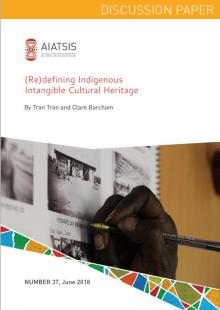(Re)defining Indigenous Intangible Cultural Heritage
Publication date
Type
Discussion paper
Indigenous knowledges cannot be broken down into components that are measurable, ownable and owned. This fragmentation is reflected in the multitude of regimes that have been created in order to ‘protect’ Indigenous knowledge and is further exacerbated by strong distinctions between both tangible and intangible heritage. This paper maps out the multiple ways in which Indigenous knowledge has been defined and understood, how it is generated and recorded in Australia and reviews the implications of these definitions. We argue that Indigenous individuals, families, communities and nations should be empowered to assert and practice their culture in a manner that makes the most sense to them.
